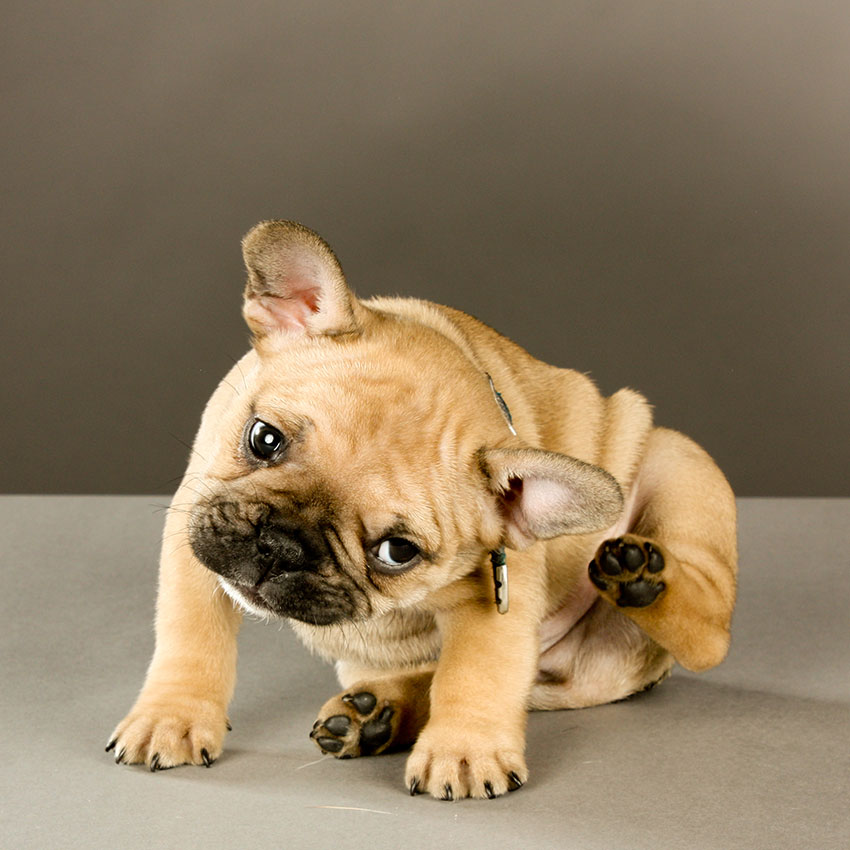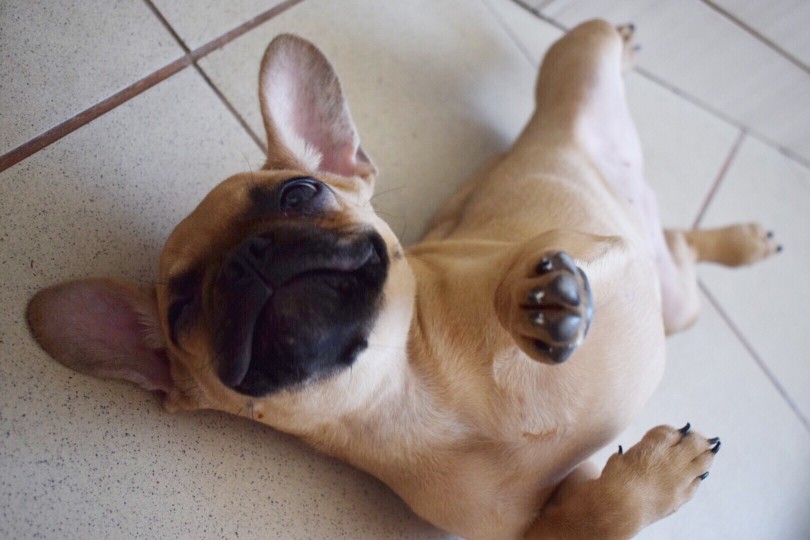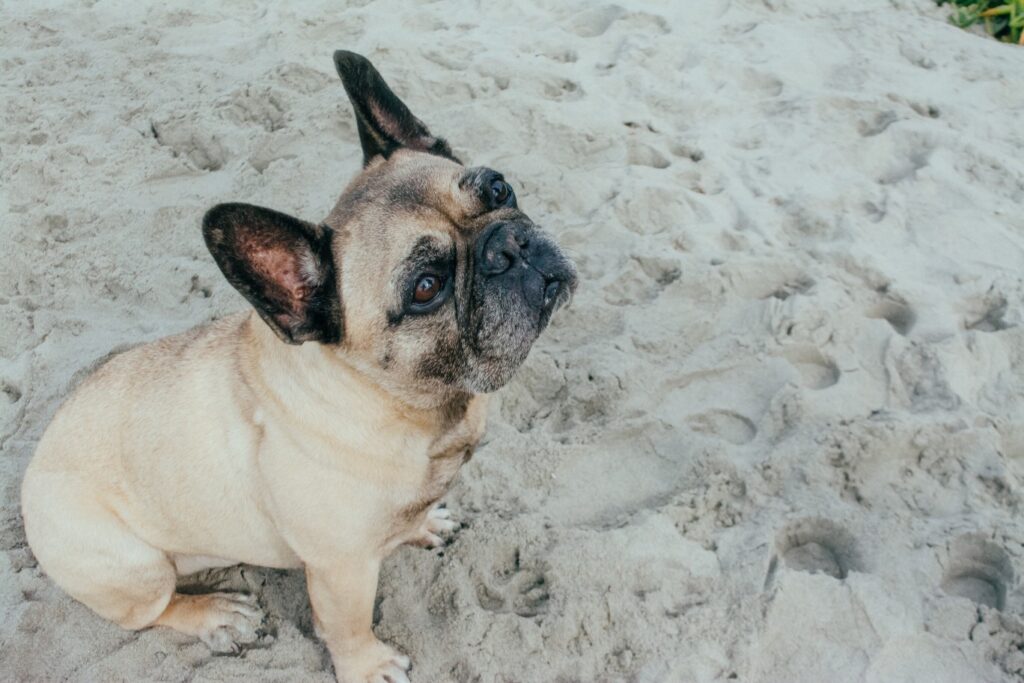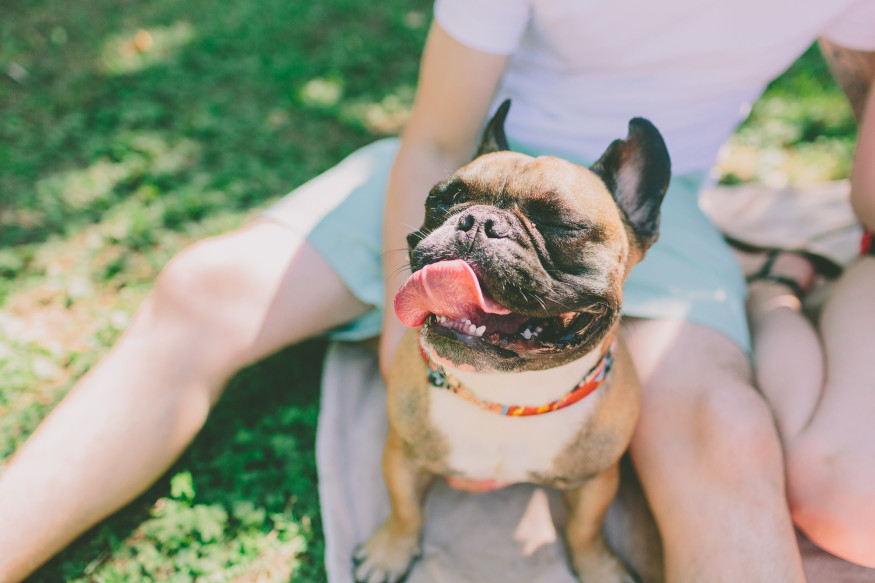Fleas on French bulldogs are undoubtedly the most vexing and stubborn parasites that can afflict dogs. As a pet owner, it’s important to know how to eliminate these pests permanently and relieve your furry friend of constant scratching. Dogs’ soft and warm coats make them irresistible to us, but unfortunately, also to fleas. Consequently, it’s not uncommon for dogs to come into contact with these pests. However, with a bit of knowledge, fleas on dogs can be readily managed and treated.
Are There Fleas On Your French Bulldog?
To determine if your dog has fleas, carefully inspect its skin. Fleas on French bulldogs are the most prevalent parasites that can infest your pet. They are typically dark brown, about 1-2 mm in size, and have a lifespan of 7 to 14 days. Their powerful hind legs enable them to jump up to a meter!
A single flea can lay up to 50 eggs per day, and these eggs hatch within 2 to 5 days. Fleas are tiny, wingless parasites that feed on pets’ blood. When they bite, their saliva can cause intense itching in your dog. Additionally, fleas on Frenchies can lead to secondary bacterial infections and provoke severe skin disorders and reactions. This underscores the importance of proactively addressing fleas before they become a problem.
Summer is the ideal time for flea infestations due to high humidity and temperatures, but central heating in winter means that you may have to deal with fleas all year round. Pet owners, especially first-time dog owners, often wonder if they can contract fleas from their pets.
It’s worth noting that there are over 2,000 species of fleas, but only a few can survive on humans. Fleas that typically infest dogs cannot survive on human blood, but they may linger on people or their clothing for a while.
Flea bites on humans usually occur below the knee and are most common around the ankles. These bites appear as small red dots that some individuals may not even notice unless they start itching. Once they do, the surrounding skin can become more inflamed, and scratching may lead to skin damage and possible infection.
If an allergic reaction occurs, the affected skin may turn red, itch intensely, and develop small bumps similar to pimples. As with bites from other insects, it’s important to avoid scratching, as it can exacerbate skin irritation and increase the likelihood of infection.

Symptoms Of Fleas in a Frenchie
What do flea bites on your Frenchie look like? Fleas leave small, red dots on your dog’s skin. The mildest symptoms in dogs infested with fleas are intense itching and nervousness.
With a larger number of fleas present, the dog may start to bite the areas where the fleas began feeding.
When bitten by fleas, a Frenchie may show the following signs:
- intense itching and licking of the skin,
- crusts or redness,
- irritated skin,
- sores on the skin,
- allergic dermatitis as an allergic reaction to flea saliva,
- hair loss in dogs due to fleas
- nervous behavior.
The most obvious sign that your dog has fleas is intense itching accompanied by redness and scratching, which leads to hair loss and the appearance of crusts on the skin. Changes in the skin of a dog typically occur on the back, running from the base of the tail towards the neck, although they can appear anywhere on the skin. When a flea bites a Frenchie, a high molecular weight protein in the flea saliva can trigger an allergic reaction. Flea allergy is the most common type of skin allergy in French bulldogs.
French bulldogs that are sensitive to the components in flea saliva that enter their body during a bite may develop allergic dermatitis from scratching the bitten area. Excessive scratching can lead to skin wounds and bacterial infections, resulting in complications. Fleas not only trigger allergies but also transmit intestinal parasites. In puppies and small dogs, severe flea infestations can even cause anemia.
To determine if your French bulldog has fleas, it’s best to look for them or their feces along with flea bite symptoms. Make it a habit to check your dog during regular grooming sessions. If you suspect your pooch has fleas, there are several ways to confirm the infestation.
Performing a visual inspection is essential. Look for tiny, dark insects that are smaller than ants by carefully examining your dog’s skin. Fleas tend to hang out in the armpit and groin areas of our pets since they are usually warm and protected.

Manually check your French bulldog’s skin
To reveal the skin, use your fingers to separate your dog’s fur. Flea infestation signs may include red and crusty skin, fast-moving or jumping adult fleas, or larvae that have hatched or are developing into adult fleas.
Comb your French bulldog’s coat
You can use a metal flea comb with fine teeth, available from your veterinarian or local pet stores, to comb your dog’s back or thighs. Make sure to press the comb firmly enough to reach the skin.
Flea dirt, which is flea feces, looks like finely ground black pepper and is a sign of flea infestation. Have a small container of water nearby to drown any adult fleas you remove with the comb so they cannot jump back on your dog.
White towel test
To perform a white towel test, have your dog stand on a white towel or cloth. Brush or rub their fur and check for flea dirt on the towel. Flea dirt will turn red when you apply water to it.
Regular grooming of your French bulldog
Regular grooming will not prevent flea infestation, but it can help you detect symptoms early to treat your dog promptly. If you can’t find any fleas, flea dirt, or eggs, and your dog is still scratching or appears restless, it’s best to have your veterinarian examine them.
Complications that Fleas on French Bulldogs Can Cause
In addition to skin irritation caused by flea bites, they can transmit certain diseases and cause allergies, both to your pets and to you. Therefore, flea control and prevention are extremely important.
The three most serious complications that fleas can cause in dogs are:
- flea allergy dermatitis,
- anemia, and
- infestation with tapeworms.
Flea allergy dermatitis is the most common skin disease in dogs. The disease occurs when the dog has an allergic reaction to flea saliva, causing itching, irritation, hair loss, skin crusts, and secondary skin infections.
The animal loses hair from its back and the base of its tail. Fleas in French bulldogs are extremely voracious. An animal attacked by fleas may suffer from anemia due to the loss of blood absorbed by the parasites. In case of anemia, the animal quickly gets tired.
A dog can become infested with tapeworms by swallowing a flea that is a carrier of the D. caninum larva. The parasite irritates the anus of infected animals. They try to get rid of the discomfort by rubbing the parts around the anus on the ground. This behavior is called “scooting.”
It is necessary to clean the pet of internal parasites with effective medication. Cleaning from internal parasites must be accompanied by the appropriate flea treatment. Only in this way will the treatment be effective in the long run.

Best Flea Treatment for French Bulldogs
If you notice your Frenchie scratching or appearing nervous, check to see if they have fleas. Better yet, visit a veterinarian who will definitively diagnose whether or not your French bulldog has fleas and prescribe appropriate therapy. The veterinarian will examine the French bulldog for signs of skin irritation and flea bites. They will also know exactly which parts of the French bulldog’s body to check for fleas.
The veterinarian will make a diagnosis by proving the presence of fleas on the French bulldog or by proving their feces through a test on white paper. To eliminate any doubt of other diseases, a skin scrape examination may also be performed.
Best Flea Medicine for French Bulldogs
When it comes to flea treatments for Frenchies, we recommend the following:
- Powders
Powders are a fairly old-fashioned way of treating fleas in French bulldogs because the powder must stay on the French bulldog’s fur to be effective and can cause illness if swallowed or inhaled.
- Spray
Spray is also used less frequently when it comes to flea treatment for French bulldogs, mainly thanks to the discovery of more effective “spot-on” treatments.
- Collars
Some flea collars are usually ineffective in treating fleas on French bulldogs because they have a limited range, meaning they only work in the area around the neck and can also cause hair loss or irritation. However, there is a new generation of flea collars that are much better for your French bulldog’s skin and fur and work by dispersing the active ingredient throughout the body. Remember, all French bulldog collars must have a quick-release mechanism to allow for quick release in case the French bulldog gets caught on something.
- Spot-on Treatment
These products are the simplest and most effective way to treat and prevent fleas in French bulldogs. They usually consist of a small bottle of liquid that needs to be applied to the back of your French bulldog’s neck, and its contents are designed to kill fleas and prevent the development of eggs. Several brands are available, so talk to your veterinarian to find the best one for your French bulldog.
In addition to the above treatments, there are other forms of treatment if your French bulldog has fleas, such as:
- Drugs and solutions
When a French bulldog takes an oral drug, it kills fleas when they bite the French bulldog or sterilizes them so they cannot reproduce.
- Injections
These are important for preventing the development of flea eggs, but at the same time, local treatment may also be required.
- Protect your house from fleas
There are also certain flea treatments that are intended for your living space, not for French bulldogs. There are many household sprays available that can be used on carpets and furniture.
Always follow the manufacturer’s instructions, which will usually tell you to vacuum carpets to bring flea eggs and French bulldogs to the surface. After vacuuming the carpet, it is necessary to thoroughly spray it, and then vacuum it again.
Always spray your vacuum with flea spray and discard all vacuum bags – you don’t want fleas to develop and escape from the vacuum! Always make sure that all French bulldogs are kept away from treated areas until they are well-ventilated.
Apple cider vinegar is a common ingredient in many natural remedies for removing fleas and ticks on French bulldogs.
Add 100 ml of apple cider vinegar to 200 ml of cold water. Mix it and start rubbing the preparation onto your French bulldog’s body. When preparing this simple liquid, make sure that the ratio is always two to one, two-thirds water and one-third apple cider vinegar. Always use more water! Pay attention to the head, neck, and between the legs.
Note: For the use of any natural flea remedies, always consult with your veterinarian. DO NOT treat your dog on your own.

